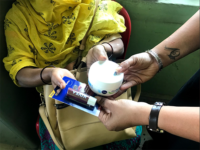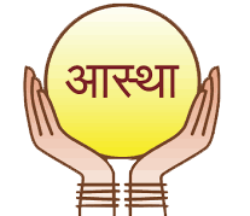
Sarita* being gifted some moisturiser and lip balm at a recent health camp
From a rural village in the Indian state of Assam, where jobs are few and far between, 16 year old Sarita* was an easy target.
It is custom in many Indian families for children to support their parents once they get to a certain age. In poorer and rural communities, this time comes far earlier than in wealthier and developed areas. Desperate to earn money to provide for herself and her impoverished family, Sarita earnestly scoured her village for any opportunities of employment. During this search, she encountered a woman who invited her to accompany her to Mumbai, where she promised she would provide Sarita with a good job – an offer certainly too good to refuse.
Upon arrival in Mumbai, Sarita soon realised that the promises made by her new friend were not exactly as they had been advertised. She was brought to a ‘ladies bar’ where she was to work as a bar-based escort; performing erotic dances and having sex with patrons for money. Sarita was terrified, but realised she trapped. She desperately wanted to return home, however with no money, no knowledge of Hindi or the local language, Marathi, and no official identification, this was not a reality. Isolated and vulnerable, Sarita was forced to enter the profession.
Due to not having a birth certificate, Sarita is unsure of her exact birthday but estimates that she is now approximately 29 years old. She is no longer employed as a sex worker due to being diagnosed HIV positive. Although bar girls are encouraged to practice safe sex, many clients pressure the women to abandon the condom with offers of more money, or by getting them drunk enough that they do not notice they are having unprotected sex. It is likely through this practice that Sarita contracted HIV. As devastating as this diagnosis was, Sarita had encountered Aastha Parivaar at a previous testing session at the bar where she was employed. She was able to reach out to them for assistance with enrolling for A.R.T treatment and counselling; a much needed lifeline in a time of immense darkness.
After a lifetime of hardship, Sarita’s story does take a happier turn. She has now been married for the past 11 years to a man who is also HIV positive. His family are unaware of the couple’s HIV status, and have been pressuring the two of them for years to have children. Afraid of passing the disease on, they were unwilling to conceive, and unable to explain to their family the justification due to fear of rejection. Recently, a the light finally appeared at the end of the tunnel. Due to Sarita and her husband both consistently receiving A.R.T. over a sustained period of time, they have both achieved an undetectable viral load and are at no risk of transmitting the disease. They were given the green light by the doctor to conceive and Sarita is now 3 months pregnant, much to the delight of her, her husband and his family.
Prior to falling pregnant, Sarita had a part-time government job which earned a respectable 9 thousand rupees per month. She has since left this job and now uses her experiences to educate women in a similar position to her as a Peer Educator with Aastha Parivaar. Due to her contacts within the community, she is able to access a variety of different bars to talk to the women employed there and explain the risks of HIV. This is a lengthy process as, at first, the women are reluctant to admit that they have sex with the clients, and claim they only work as dancers. With persistence and patience, they eventually feel comfortable enough to open up about their work, and thus are more receptive to learning about HIV. Sarita’s Peer Educator role is crucial as many of the women believe that the only reason they are encouraged to wear condoms is to prevent pregnancy. They are unaware of the devastating consequences HIV and other STIs can have on their lives and livelihood, however through the efforts of Sarita, and other Peer Educators, they come to understand the importance of practicing safe sex and undergoing regular testing.
Unfortunately, cases of young girls being forced into sex work after being lured away from their families by promises of a better life and employment in Mumbai is all too common. This practice is difficult to stop at the root cause, however with Aastha Parivaar’s help, these vulnerable women can be empowered to live healthy, full lives and switch professions if they choose.
Sarita’s family in Assam are unaware of her past as a sex worker and her HIV status. Despite this, Sarita now has the health, finances and confidence to visit them once to twice per year, which undoubtedly will be even more special now that she has a baby on the way.
*Name has been changed to protect the subject’s identity
